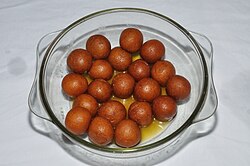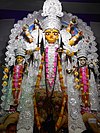Pantua
 Pantua served in a bowl | |
| Type | Confectionery |
|---|---|
| Course | Dessert |
| Place of origin | West Bengal, India |
| Region or state | Bengal region of the Indian subcontinent |
| Associated national cuisine | India, Bangladesh |
| Main ingredients | Semolina, khoya, milk, ghee and sugar |
Pantua (Bengali: পান্তুয়া) is a local confection from the Indian subcontinent, notable in West Bengal, Eastern India and Bangladesh.[1] It is a traditional Bengali sweet made of deep-fried balls of semolina, chhena, milk, ghee and sugar syrup. Pantuas range in colour from pale brown to nearly black depending on how long they are fried. Rose water, cardamom or other flavourings are sometimes added to the sweet.
Pantua is very similar to the cheese-based fried sweet ledikeni. The distinctive feature of ledikeni is its molten sugar syrup of lightly flavored cardamom powder.[2] The name ledikeni is a rendition of "Lady Canning" and was first used by confectioner Bhim Chandra Nag, when he renamed his pantuas specially prepared on the occasion of the birthday of Countess Charlotte Canning, wife of Governor-General Charles Canning.[3] A sweet very similar to the modern pantua and ledikeni, but made of rice flour, is mentioned in the 12th century Sanskrit-language text Manasollasa.[4]
Pantua is similar to gulab jamun,[1] and could be called a Bengali variant of that dish.[5]
See also[edit]
Notes[edit]
- ↑ 1.0 1.1 Madhushree Basu Roy. "Pantua- The Bengali Gulab Jamun but it's Different". pikturenama.com. Retrieved 10 October 2021.
- ↑ Ishita Dey (2015). Darra Goldstein (ed.). The Oxford Companion to Sugar and Sweets. Oxford University Press. p. 743.
- ↑ Krondl, Michael (2011). Sweet invention: A history of dessert. USA: Chicago Review Press. pp. 67–69. ISBN 978-1-55652-954-2.
- ↑ Michael Krondl (2011). Sweet Invention: A History of Dessert. Chicago Review Press. pp. 41–42. ISBN 978-1-55652-954-2.
- ↑ Charmaine O'Brien (3 February 2003). Flavours Of Delhi: A Food Lover's Guide. Penguin Books Limited. pp. 145–. ISBN 978-93-5118-237-5.




